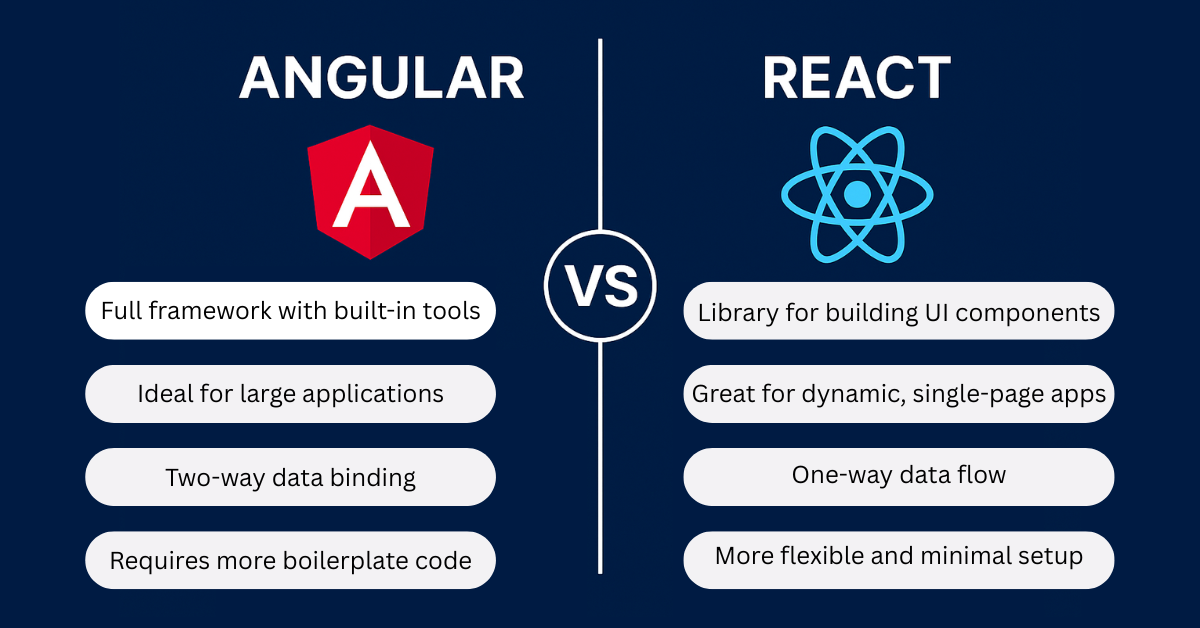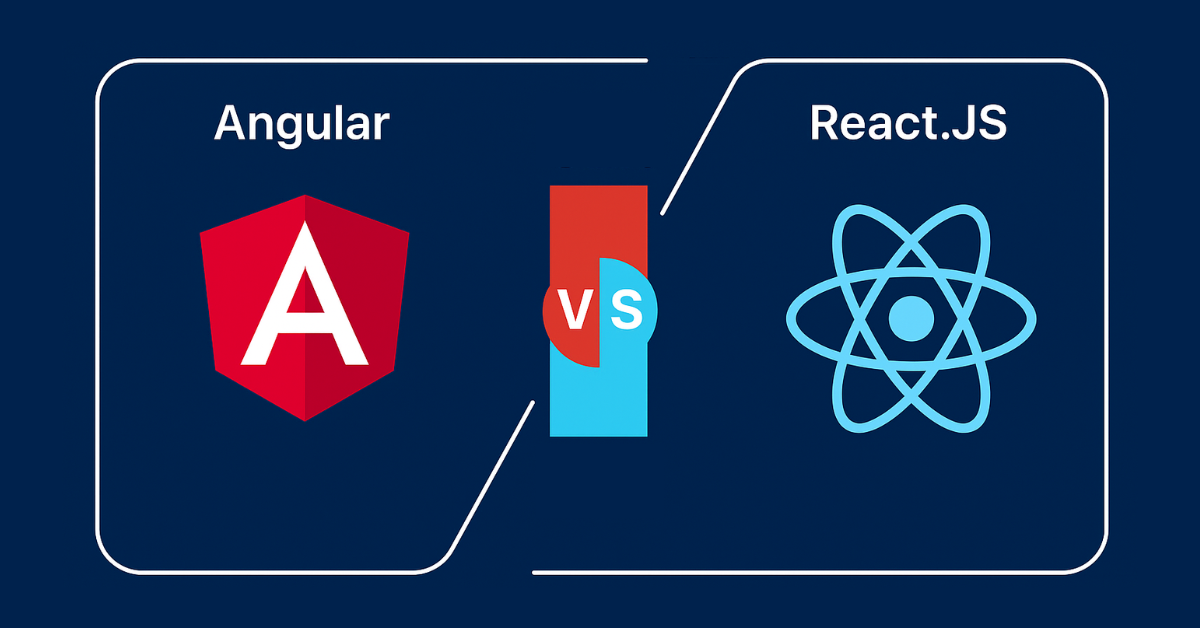When starting a new web project, one of the most important decisions you will face is choosing the right front-end technology. The tools you select can affect not only how your application looks but also how it performs, scales, and adapts over time. Among the most popular choices, Angular vs React often comes up in discussions. Both are trusted by thousands of businesses and developers worldwide, but they offer very different approaches. So, how do you know which one is right for your project? This blog will break down the differences, compare their strengths, and give clear guidance so you can make an informed choice.
What is Angular?
Angular is a full-fledged front-end framework developed and maintained by Google. Built on TypeScript, it is known for its inflexible structure and robust features. With Angular, developers get everything out of the box: routing, form validation, dependency injection, and testing utilities.
Key Features of Angular
- Two-Way Data Binding: Keeps the model and view automatically in sync.
- Component-Based Architecture: Helps build modular and reusable UIs.
- Dependency Injection: Makes it easier to manage services and business logic.
- Complete Ecosystem: Offers built-in tools for routing, HTTP requests, and state management.
Best Use Cases
Angular is used for large-scale enterprise applications, complex dashboards, and apps where strict architecture is required. For example, financial platforms or healthcare systems often benefit from Angular’s structured approach.
What is React?
React, developed by Meta (formerly Facebook), is a JavaScript library rather than a full framework. This flexibility is one of the reasons for its huge popularity. React focuses on building interactive user interfaces and lets developers choose external libraries for routing and state management.
Key Features of React
- Virtual DOM: Improves performance by updating only the necessary parts of the UI.
- Reusable Components: Speeds up development and ensures consistency.
- Unidirectional Data Flow: Provides better predictability and easier debugging.
- JSX Syntax: Combines HTML and JavaScript, making UI development more intuitive.
Best Use Cases
React is ideal for single-page applications, e-commerce sites, and startups where flexibility and rapid iteration matter. Companies like Instagram, Airbnb, and Netflix rely on React to handle high-performance, user-focused applications.
Angular vs React: A Head-to-Head Comparison

Learning Curve and Developer Experience
Angular can be challenging to learn because of its comprehensive structure and support for TypeScript. React, on the other hand, has a shorter learning curve, making it beginner-friendly while still offering scalability.
Performance and Speed
React’s Virtual DOM gives it an edge in performance, especially in applications with frequent updates. Angular is fast too, but its real strength lies in handling large, complex projects with multiple modules and data interactions.
Architecture and Flexibility
Angular provides everything in a complete package, which can be both a strength and a limitation. React offers flexibility, allowing developers to choose from a variety of tools and libraries. If you prefer freedom, React is a great choice; if you want a ready-to-go solution, Angular works better.
Community and Ecosystem
React’s community is huge, with countless libraries and third-party tools. Angular also has a strong backing from Google and a loyal developer base, but its ecosystem is more structured and less experimental.
UI Components and Libraries
Both support UI/UX design at a high level. Angular comes with built-in UI libraries, while React relies on external ecosystems such as Material UI and Ant Design.
Key Factors to Consider Before Choosing
- Project Size: For small to mid-level projects, React might be more efficient. For enterprise-grade apps, Angular could be the safer bet.
- Team Expertise: Do your developers prefer JavaScript or TypeScript? That choice alone can guide you.
- Time-to-Market: React often accelerates development with its reusable components.
- Scalability: Angular’s structured architecture supports long-term growth.
- Integration Needs: React is flexible and works with other tools, while Angular has everything you need built in.
When to Choose Angular
- You are building an enterprise-level app with multiple teams.
- You need a strict architecture and built-in tools.
- Your team is already comfortable with TypeScript.
- The project requires long-term scalability with minimal external dependencies.
When to Choose React
- You are building a startup or mid-sized web project with tight deadlines.
- You want flexibility and freedom in choosing libraries.
- Your team prefers working with JavaScript.
- The project focuses on rich interactivity and dynamic user interfaces.
Cost and Resource Availability
Finding skilled developers is another factor in the Angular vs React discussion. React developers are often more widely available, making it easier to staff projects quickly. Angular developers, while fewer, are experienced with large-scale applications. Cost depends on the talent pool in that region, but overall, React developers might be more budget-friendly due to higher availability.
Future Trends
Both React and Angular continue improving and adding new features. Angular is focusing on improved performance and developer tools, keeping its stronghold in enterprise solutions. React is pushing boundaries with server-side rendering (SSR), concurrent features, and React Native for mobile app development.
For many businesses, the decision boils down to React and Angular, fitting different goals. While React dominates the startup ecosystem, Angular continues to thrive in complex, enterprise-grade environments.
React vs Angular: Which is Better?
This question does not have a one-size-fits-all answer. If performance, flexibility, and speed to market matter most, React may be the right choice. If structure, scalability, and a full toolkit are your priorities, Angular will serve you well.
Conclusion
The Angular vs React debate will likely continue as both frameworks evolve and adapt to modern web development challenges. The best choice ultimately depends on your project goals, team expertise, and long-term vision.If you want a structured, enterprise-grade solution, Angular is often the winner. If you need agility, flexibility, and faster time-to-market, React may be your best partner. The decision should align with your project’s unique needs. When in doubt, consult Seventh Foundation, the best web development company, which can guide you through the process and recommend the best technology stack tailored to your business success.

Leave a Reply